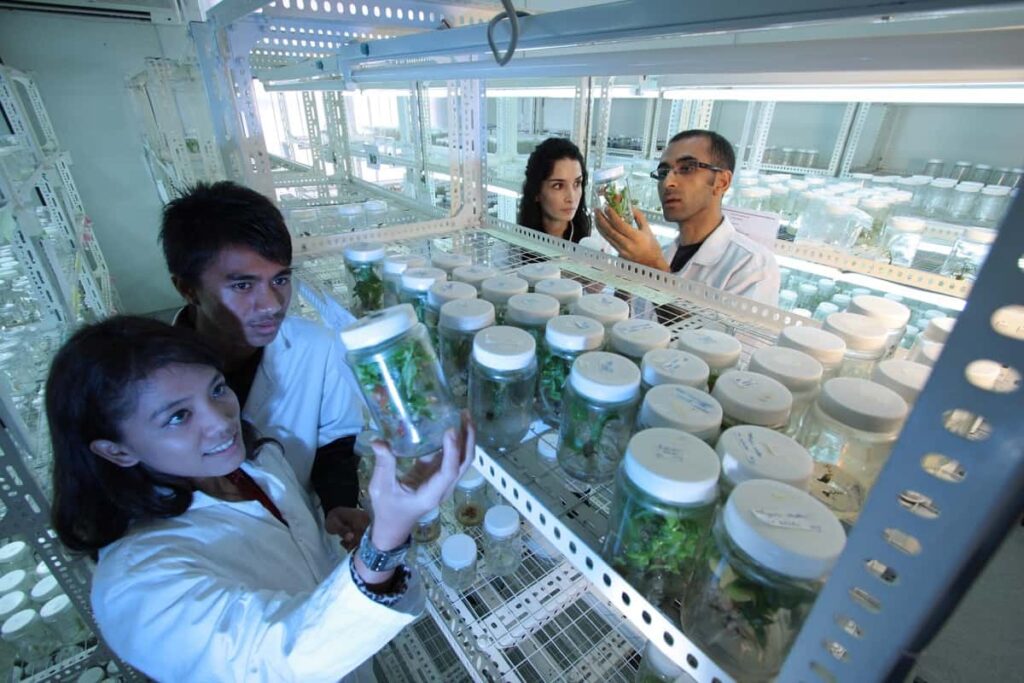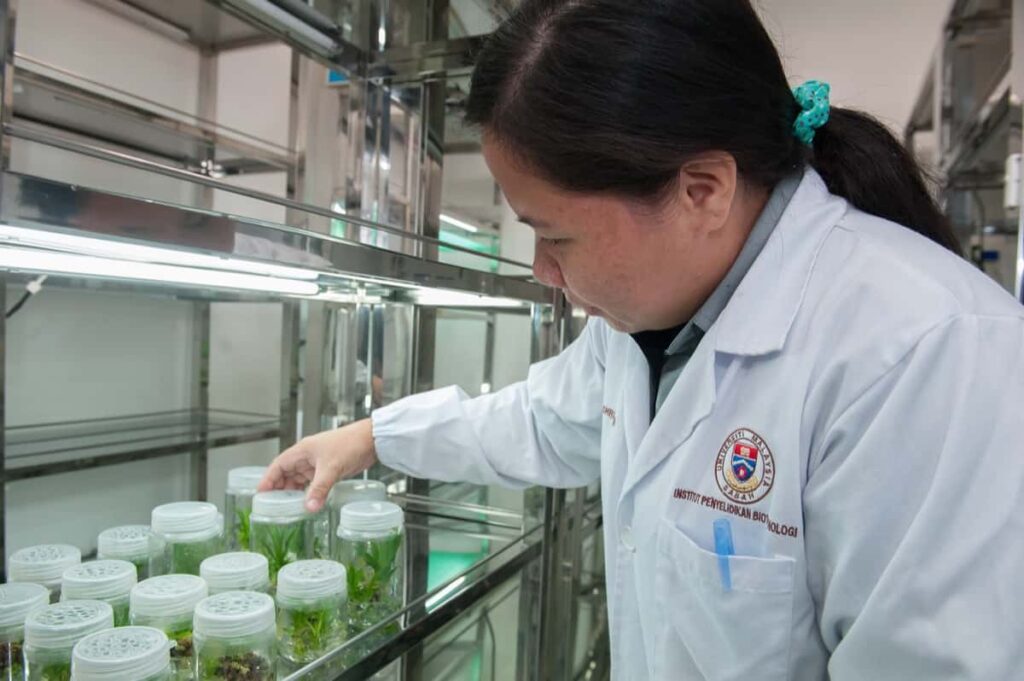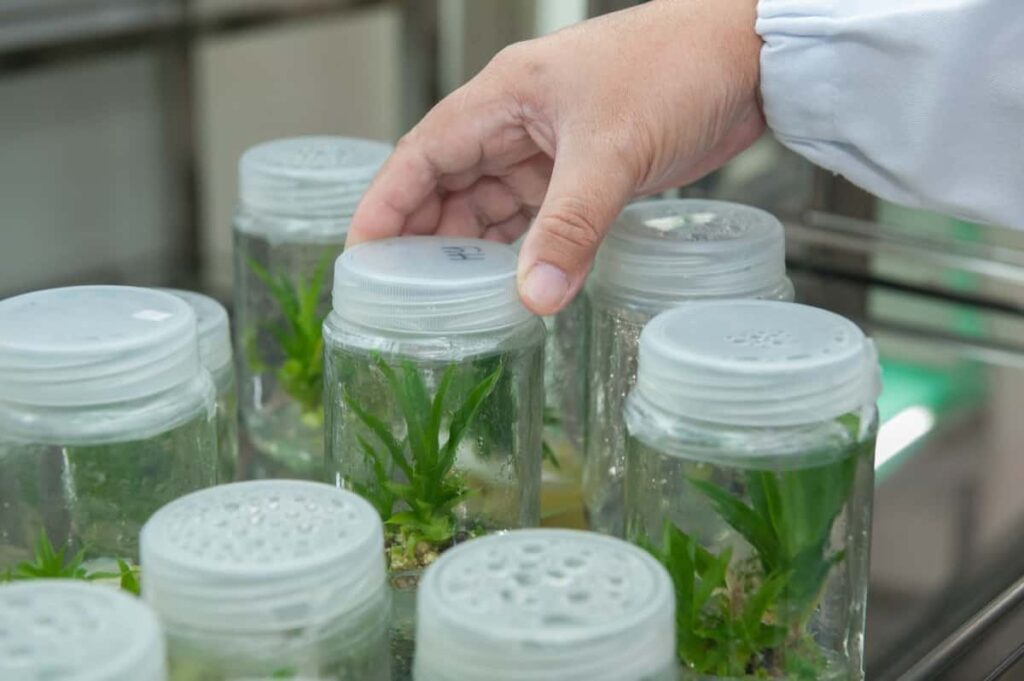Agricultural biotechnology is the scientific and engineering principal application to the processing of agricultural products. It includes using technology to modify living organisms to make or improve crops and livestock. In India, agricultural biotechnology is used to develop more drought-resistant crops, improve the nutritional value of food crops, and create new varieties of plants and animals resistant to disease.

The field of agricultural biotechnology offers many job opportunities for those with the right skills. In this article, we will give the role of agricultural biotechnology in India, examples of its applications, jobs in the field, salaries, courses, and colleges.
Agricultural biotechnology in India
What is Agricultural Biotechnology?
Agricultural biotechnology includes a wide range of techniques, from the traditional breeding of crops and livestock to the more modern techniques of genetic engineering and tissue culture. The main aim of agricultural biotechnology is to improve the efficiency and productivity of agriculture, with the ultimate goal of providing sufficient food for a growing world population. In India, agricultural biotechnology is used for different purposes, including developing different crops resistant to disease and pests and improving livestock breeds.
In addition to its potential benefits for agriculture, agricultural biotechnology offers exciting career opportunities for those pursuing this field. Several colleges and universities in India offer courses in agricultural biotechnology, and many research institutes are also engaged in this work. With the right qualifications, it is possible to find employment in the public and private sectors.
In case you missed it: Agricultural Business Plan: How to Start, and Profitable Ideas

The history of agricultural biotechnology in India
Agricultural biotechnology is a set of techniques used to modify living organisms for use in agriculture. It includes genetic engineering, tissue culture, and other techniques. Agricultural biotechnology has been used in India for centuries. Traditional methods such as crop rotation and the use of natural pesticides and fertilizers have helped Indian farmers increase yields and improve the quality of their crops. In recent years, modern agricultural biotechnology has played an increasingly important role in Indian agriculture.
The first genetically modified (GM) crop to be cultivated in India was Bt cotton, which was introduced in 2002. BT cotton is engineered to resist certain pests, allowing farmers to reduce their use of chemical pesticides. Since its introduction, BT cotton has been a success story in India, with yields increasing by 20-40% in many areas. Other GM crops introduced in India include brinjal (eggplant), mustard, and rice. While these crops are still in the early stages of development, they have the potential to make an important impact on Indian agriculture.
In addition to GM crops, agricultural biotechnology is also being used to develop new varieties of plants that are more resistant to disease and pests. For example, scientists at the Indian Council of Agricultural Research (ICAR) are developing a variety of Wheat resistant to stem rust. This deadly disease has devastated wheat crops around the world.
The current state of agricultural biotechnology in India
India’s Agricultural Biotechnology industry is growing rapidly and will reach Rs. 1,500 crores by 2023. The sector has been attracting attention from both the public and private sectors due to its potential to improve crop yields and help farmers overcome the challenges posed by climate change. There are currently more than 200 companies operating in the Agricultural Biotechnology space in India, with most of them being small and medium enterprises (SMEs).
Most of these companies are involved in developing and producing genetically modified (GM) crops, with some also engaged in research and development (R&D) activities. The GM crops approved for commercial cultivation in India include cotton, brinjal, maize, and rice. These crops have been designed to resist pests and diseases, as well as to tolerate herbicides. BT cotton, for instance, contains a gene from the soil bacterium BT (Bacillus thuringiensis) that helps it ward off bollworms, a major pest of cotton plants.
In case you missed it: Top 15 Agricultural Universities in the USA: Best List

The Indian government has taken some important steps to promote Agricultural Biotechnology. In 2016, it launched the National Mission on Agricultural Biotechnology (NMAB) with an outlay of Rs. 500 crores. The mission aims to boost research and development in the field and create an enabling environment for the new technologies adopted by farmers.
How is biotechnology used in Agriculture?
Biotechnology uses living organisms to modify or make products or processes for specific use. In agriculture, biotechnology is used to develop crops with improved traits like resistance to pests and diseases, tolerance to herbicides, or improved nutritional content. Traditional breeding methods can take years to produce a new variety of crops with desired characteristics. However, with biotechnology, it is possible to introduce specific changes in the genetic makeup of a plant in a much shorter time frame.
This allows for the development of new varieties of crops that are better suited to the changing needs of farmers and consumers. There are many different ways in which biotechnology can be used in agriculture. One common application is the use of genetically modified (GM) crops. These are plants that have had their DNA altered using genetic engineering techniques. This aims to introduce one or more new traits that are not naturally present in the species. For example, GM crops have been developed that are resistant to herbicides, pests, or diseases.
Another area where biotechnology is being used in agriculture is in the development of so-called “smart” crops. These plants have been genetically engineered to respond more to environmental conditions such as temperature and moisture levels. For example, there has been researching into developing crops that can tolerate drought conditions. This could be important in places where water supplies are limited or farmers face unpredictable weather patterns due to climate change.
The future of agricultural biotechnology in India
Since the early 1990s, agricultural biotechnology in India has been used to improve crops through genetic engineering and, more recently, to develop biofuels. The Indian government has supported agricultural biotechnology, investing heavily in research and development. In 2013, the government approved the use of genetically modified (GM) crops for commercial cultivation, and there are now GM cotton and brinjal (eggplant) grown in India.
The future of agricultural biotechnology in India looks bright, with continued government support and an increasing number of private companies investing in research and development. New applications of biotechnology are being developed all the time, such as using GM crops to produce pharmaceuticals or enzymes to break down biomass for biofuel production. With its large population and need for food security, India is likely to continue to be a leader in agricultural biotechnology in the years to come.
The benefits of agricultural biotechnology
It is the application of engineering and scientific principles to the processing of materials by using biological agents to provide some goods and services. The use of biotechnology in agriculture has increased exponentially in the last few years due to the many benefits it offers. Agricultural biotechnology can be used for various purposes, including improving crop yield, quality, and resistance to pests and diseases, developing new crops, and producing pharmaceuticals and industrial enzymes.
Some of the specific benefits of agricultural biotechnology include the following:
- Increased crop yields: One of the biggest benefits of agricultural biotechnology is that it can help farmers increase crop yields. This is important in developing countries where food security is a major issue.
- Improved crop quality: Agricultural biotechnology can also be used to improve the quality of crops. For example, crops can be engineered to be more nutritious or to contain higher levels of vitamins and minerals.
- Pest and disease resistance: Another big benefit of agricultural biotechnology is that it can help crops become more resistant to pests and diseases. This is extremely important as pests, and diseases can cause major losses for farmers.
- Developing new crops: Agricultural biotechnology can also be used to develop new types of crops that are better suited for specific environments or have improved characteristics such as higher yields or pest resistance.
In case you missed it: 22 Agricultural Apps for Smart Farming Solutions: Help with Farm Management, Soil, and Crop Yield

The drawbacks of Agricultural Biotechnology
Agricultural biotechnology has been touted as a way to increase crop yields, decrease pesticide use, and improve the nutritional content of foods. However, there are many drawbacks to this technology. One major concern is that genetically modified crops can cross-pollinate with non-genetically modified crops, contaminating them with genetic material that may harm human health or the environment.
There is also the potential for GM crops to create new pests or weeds, which could have devastating impacts on agriculture. Another concern is that Monsanto, the largest producer of GM seeds, has a monopoly on the market and can charge high prices for its products. This puts small farmers at a disadvantage and makes it difficult for them to compete.
Finally, there is the issue of intellectual property rights. Monsanto owns the patents on many GM crops, which means that farmers have to pay royalties if they want to grow them. This puts an additional financial burden on farmers and further increases the price of GM seeds.
Agricultural biotechnology courses in India
In India, agricultural biotechnology is an upcoming field with immense potential. With the ever-growing population and the need for more food, agricultural biotechnology can help increase yields. Agricultural biotechnology has many aspects, from developing new crops to improving existing ones. There are a few courses in agricultural biotechnology in India that students can pursue.
These include a Bachelor of Science in Agricultural Biotechnology, a Master of Science in Agricultural Biotechnology, and a Ph.D. in Agricultural Biotechnology. Each of these programs will cover different topics related to agricultural biotechnology. Some of the topics that students will learn about include plant science, genetics, microbiology, and biochemistry. They will also learn about crop production, management, food processing, and safety.
In addition, students will gain practical experience through lab work and fieldwork. After completing one of these courses, graduates can find jobs in various sectors such as agriculture, research, education, and government. They can also work in private companies that are involved in the development or production of agricultural products.
Agricultural biotechnology colleges in India
In India, agricultural biotechnology is an emerging field with immense potential. Agricultural biotechnology can help farmers increase yields, improve crop quality, and reduce production costs. Additionally, agricultural biotechnology can help address the most pressing issues facing Indian agriculture, such as climate change, water shortages, and soil degradation.
In case you missed it: Agriculture Courses Offered in India – List of Agricultural Universities and Colleges

There are several colleges and universities in India that offer programs in agricultural biotechnology. Some of the leading agricultural biotechnology colleges in India include Indian Agricultural Research Institute (IARI), National Dairy Research Institute (NDRI), the Indian Veterinary Research Institute (IVRI), Central Potato Research Institute (CPRI), and Central Tobacco Research Institute (CTRI). These institutions offer a variety of courses in agricultural biotechnology at both the undergraduate and graduate levels.
The job market for agricultural biotechnologists in India is extremely promising. Agricultural biotechnologists are in high demand by both the public and private sectors. In addition to traditional roles in research and development, there are also opportunities for agricultural biotechnologists to work in policy, regulation, and marketing. With the right skills and training, graduates of agricultural biotechnology colleges in India can find rewarding careers in this exciting field.
Agricultural biotechnology jobs in India
The use of biotechnology in agriculture has led to the creation of new and exciting job opportunities in India. Agricultural biotechnology jobs in India are expected to grow significantly in the coming years as the country looks to modernize its agricultural sector. There are many different types of agricultural biotechnology jobs available in India. Some of the most popular roles include:
- Agricultural Research Scientists: These professionals research various aspects of plant and animal biology to develop new and improved crop production methods. They also work on developing genetically modified crops resistant to pests and diseases.
- Agricultural Extension Officers: These officers work with farmers and advise them on the best ways to utilize biotechnology in their farms. They also provide information on the latest technology developments and government schemes that can benefit farmers.
- Agricultural Biotechnologists: These professionals develop and implement biotechnological solutions for problems faced by the agriculture sector. Their work includes developing new pest-resistant crops, developing methods for increasing crop yields, and improving the quality of food products.
- Animal Biotechnologists: These professionals work with livestock animals to improve their health and productivity. Their work includes developing vaccines and other animal medicines and researching ways to improve animal breeding methods.
- Plant Breeding Scientists: These scientists develop new varieties of plants resistant to pests, diseases, and extreme weather conditions.
Agricultural biotechnology salary in India
The average salary for an Agricultural Biotechnologist in India is Rs 575,000. This is just an average figure, and salaries can range from anything between Rs 300,000 to Rs 1,200,000 per annum. The range depends on factors such as employer type, work experience, skillset, geographical location, etc. However, with the right skill set and experience, one can easily earn more than Rs 1 million per annum in this field.
Many agricultural biotechnology companies in India are looking for talented individuals with the right skill set. Some top companies include Monsanto India, Syngenta India, BASF India, Advanta Seeds, etc. These companies offer good salary packages and perks to their employees. Apart from working in the private sector, many government jobs are also available in this field. The Indian Council of Agricultural Research (ICAR) is one of the main organizations offering agricultural biotechnologists jobs.
Other government organizations include the Department of Biotechnology (DBT), the Department of Science and Technology (DST), etc. If you are involved in pursuing a career in agricultural biotechnology, you should consider studying courses like BTech in Agricultural Engineering or BSc in Agriculture. There are many colleges and universities across India that offer these courses. Some top institutions include IARI New Delhi, Punjab Agricultural University Ludhiana, Tamil Nadu Agricultural University Coimbatore, etc.
In case you missed it: Key Rules to Start a Butterfly Garden from Scratch: Butterfly Gardening Layout, Design for Home, and Backyard

Is agricultural biotechnology a good career?
Agricultural biotechnology is a promising field with a lot of potentials. It mainly offers a unique blend of science and agriculture and can lead to careers in research, development, and production. The scope for agricultural biotechnology in India is huge, as the country is home to a large population of farmers and agri-businesses. The growing demand for new technologies to increase crop yields and improve quality makes it an exciting time to be involved in this field
There are many different career options available in agricultural biotechnology. Researchers may focus on developing new genetically modified (GM) crops or working on ways to improve existing GM varieties. Others may work on developing novel pest control methods or identifying new uses for plants and animals.
Production jobs are also available in agricultural biotechnology. These roles involve overseeing the cultivation of GM crops, ensuring that they meet all safety and quality standards. There is also increasing demand for marketing and sales professionals promoting GM products to consumers. Courses in agricultural biotechnology are offered at many universities across India. A bachelor’s degree in agriculture is typically required for entry-level positions. More advanced positions may require a master’s degree or Ph.D.
Conclusion
Agricultural biotechnology is an exciting and rapidly-growing field in India with many potential applications. With the right training, you can become a part of this industry and help shape the future of agriculture in India. We hope this information has given you some insight into agricultural biotechnology and what it could mean for your career.
- Management Pests and Diseases in Your Cotton Field
- Sheep Farming Business Plan for Beginners
- Aquaponic Farming at Home: A Step-By-Step Guide
- Profitable Village Farming Business Ideas in 2024
- High-Yield Aquaculture: Fast-Growing Fish for Farming
- Effective Fish Pond Construction Techniques for Beginners
- Irrigation and Water Management in Pineapple Farming
- Blossom to Harvest: Mastering Flowering and Pollination in Papaya Farming
- Pig Fattening Essentials: From Selection to Sale for Beginners
- Raising Wagyu Cattle: A Complete Guide for Premium Beef Production
- Soil Types and Their Water Holding Capacity
- Optimizing Irrigation Schedules for Coconut Groves for Enhanced Yield
- Espresso Your Garden: Coffee Grounds for Healthier Acid-Loving Plants
- The Best Soil Mix for Snake Plants: How to Mix Your Own Snake Plant Soil
- Green Thumb Success: Expert Tips for Cultivating Greenhouse Beans All Year Round
- Bloom All Year Round: The Ultimate Guide to Indoor Hyacinth Care
- Eco-Friendly Gardening: How to Make Liquid Fertilizer from Kitchen Waste
- Ultimate Guide to Grow Anise in Pots: Explore Seed Propagation to Harvesting
- Guide to Raising Chester White Pigs: Discover Breed Facts to Growth Management
- Mastering the Elegance: The Ultimate Guide to Weeping Cherry Tree Care, Planting, and Maintenance
- Ultimate Guide to Planting Garlic in Grow Bags: Growing Strategies for Beginners
- How to Fix Spider Plant Leaf-Related Problems: Natural and Organic Remedies
- 10 Reasons Why Your Tulsi Plant is Shedding Leaves: Home Remedies and Solutions
- Optimizing Growth and Yield: The Advantages of Palm Bunch Ash Fertilizer
- Utilizing Neem Oil Extract as a Natural Pesticide for Hydrangea
- From Soil to Harvest: Various Ways in Which Farmers Can Use AI Tools
- Steps to Encourage and Induce Citrus Flowers: A Comprehensive Guide
- How to Fix Snake Plant Leaf-Related Issues: Natural and Organic Remedies
- Transform Your Garden into a Fragrant Oasis with Raat Ki Rani (Night Blooming Jasmine)
- Discover the Ideal Chicken Breeds for Philippine Farms
- How to Create a Poultry Egg Farm Business Plan for Profits
- Grow Lemon Cucumbers Like a Pro: Insider Techniques for Bountiful Yields
- Ultimate Guide to Caring for Your Pink Princess Philodendron: Tips for Thriving Variegation
- Areca Nut Profit Per Acre: Calculating Yield and Cost of Cultivation
- How Kaveri Chicken is Becoming a More Profitable Breed in Indian Backyards
- Transform Your Barn: 9 Steps to Convert a Horse Stall into a Chicken Coop
